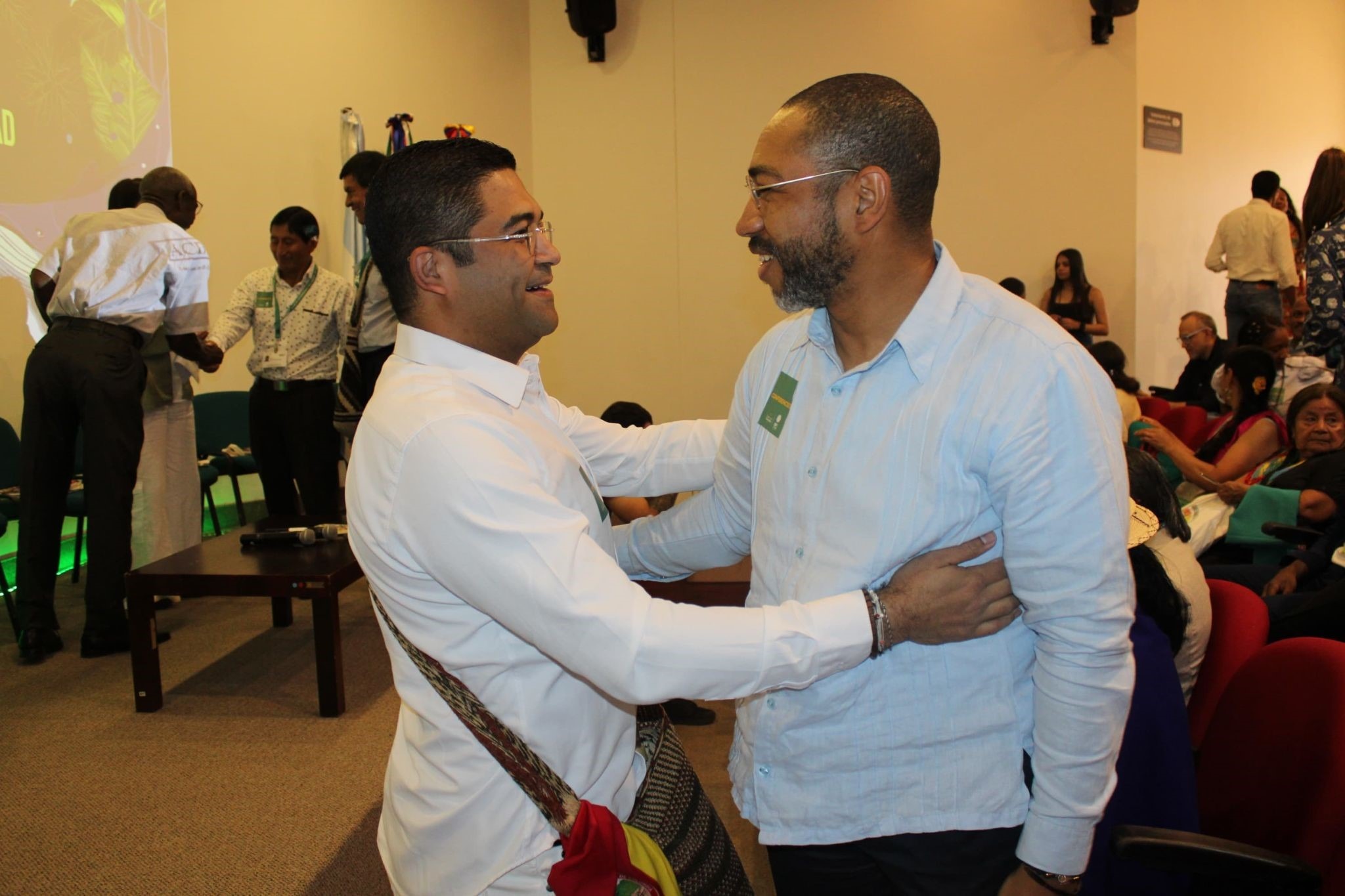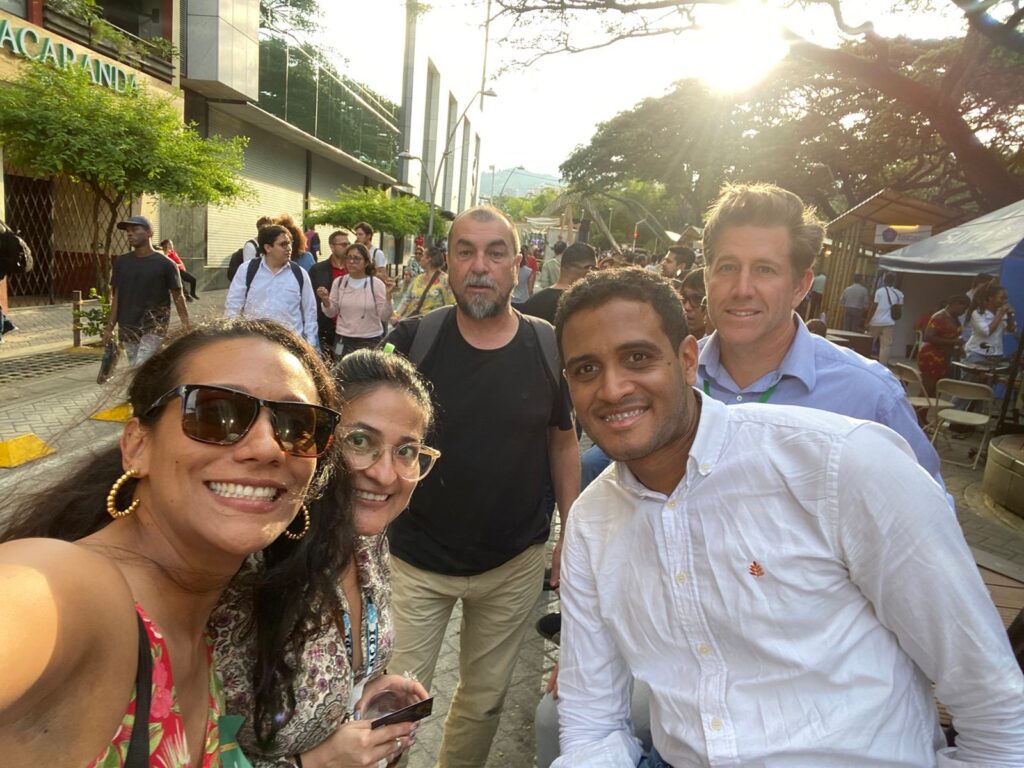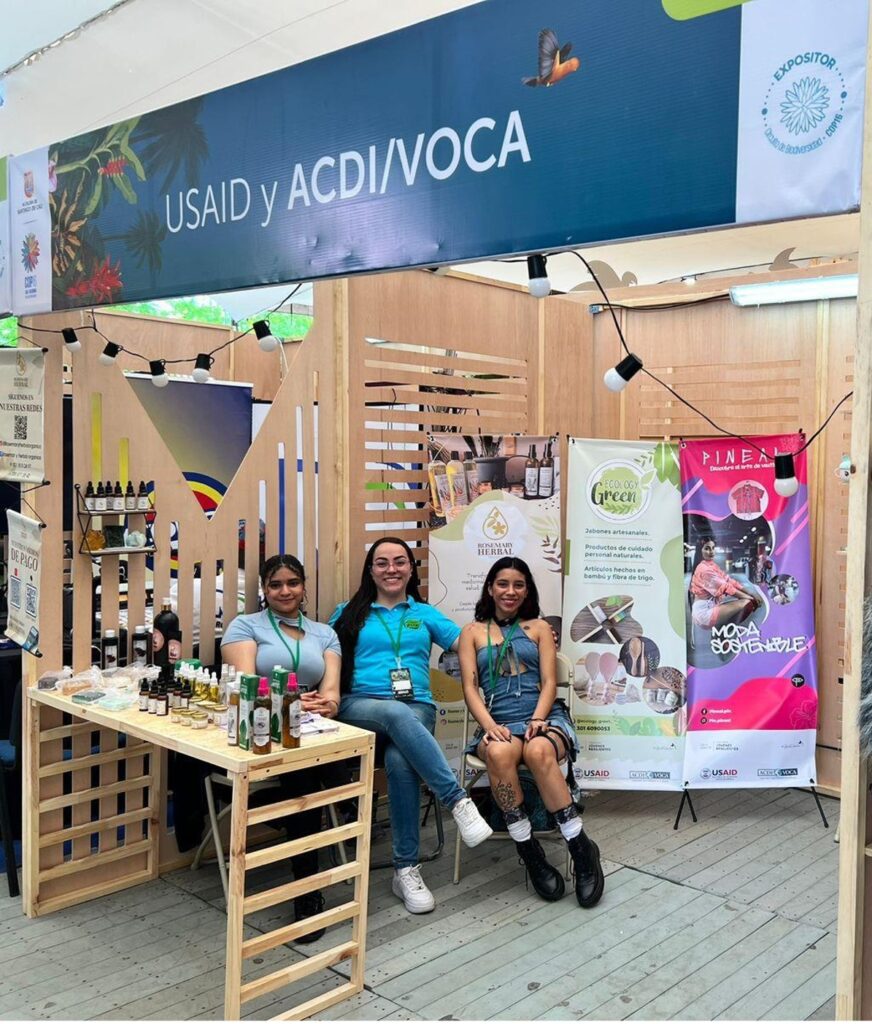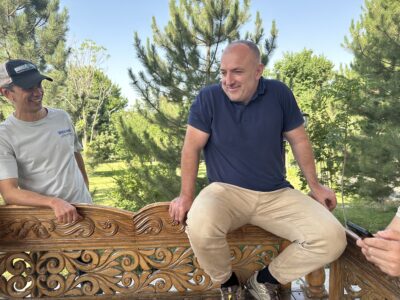
In October, world leaders came together for the 16th meeting of the Conference of the Parties to the United Nations Convention on Biological Diversity, known as COP16, held in Cali, Colombia, where ACDI/VOCA, our affiliate organization Fundación ACDI/VOCA Latin America (FAVLA), and partners attended. The COP is a two-week global event in which country leaders, ethnic groups, private sector companies, and civil society groups discuss strategies for conserving biodiversity. As the host, Colombia chose the theme of “Peace with Nature,” highlighting the role of the 2016 historic peace accords signed by the government of Colombia and the largest guerilla group in the country. The 2024 event was also known as “the People’s COP,” with a large area in the center of the city devoted to public art, exhibitions, salsa music, and more.
“COP16 was a unique opportunity for the world to recognize the leadership and resilience of youth and ethnic communities in biodiversity conservation. Their vision of ‘Peace with Nature’ should serve as a global inspiration to unite efforts and build a more sustainable future.”
— Jimena Niño, ACDI/VOCA’s Chief of Party of the Youth Resilience Activity in Colombia
A complicated relationship with nature
Colombia boasts incredible amounts of biodiversity, spanning from unique dry forests in the north, savannahs in the northeast, mountains in the center, Pacific forests in the west, and the Amazon in the southeast. This range of habitats gives the country incredible biodiversity, including the greatest bird diversity in the world. (Colombia has 1,900 bird species, which is 20 percent of the world’s total bird species). Biodiversity loss stems primarily from deforestation. Deforestation spiked in 2017-2018 following the peace accords, as settlers, ranchers, and others grabbed land that was previously inaccessible.

In 2023, thanks in part to the government’s response and the support of ethnic communities who inhabit forest areas, deforestation dropped 36 percent to its lowest level in 23 years. Today, deforestation threats continue, as does the threat of violence against environmental and ethnic leaders.
Ethnic forest governance
ACDI/VOCA aims to foster social inclusion and economic opportunities in Colombia, especially for youth and ethnic populations. Through the Indigenous People and Afro-Colombian Empowerment (IPACE) Activity, funded by USAID, ACDI/VOCA supports ethnic inclusion through governance work, economic opportunities, and the preservation of cultural heritage, with an emphasis on the peace process and biodiversity conservation. Ethnic participation is especially relevant to protecting biodiversity because research has consistently shown the importance of indigenous and ethnic people’s role in conserving forestlands.
Members of the IPACE Activity team, led by Chief of Party and Cali native Luis Sevillano, attended COP16 to support sessions with their partners. For example, three women leaders who work with the IPACE Activity presented “Ethnic Perspectives in Eco-Feminism” and discussed challenges and opportunities as women working to conserve forest territory. Afro-Colombian and indigenous partners also presented on political strategies involving the Peace Accord and related policies to advance self-governance for conservation. Additionally, representatives of an ACDI/VOCA-led and Inter-American Development Bank-funded conservation project in northern Colombia’s Catatumbo and Paramillo National Natural Parks presented on community involvement in the design of conservation and livelihood strategies.
“This event was an opportunity to reaffirm IPACE’s commitment to amplifying the voices of ethnic communities in the pursuit of environmental justice. At COP16, indigenous and Afro-Colombian communities succeeded in bringing their concerns about climate change and its disproportionate impact on their territories to the discussion table, inviting the world to embrace a shared responsibility for environmental conservation and biodiversity protection.”
— Luis Sevillano, ACDI/VOCA’s Chief of Party of the IPACE Activity in Colombia
Green entrepreneurship
Beyond forest and biodiversity conservation, COP16 showcased hundreds of green entrepreneurs from around Colombia, promoting biodiversity-based businesses in areas such as coffee, cocoa, tropical fruits and nuts, handicrafts, native building materials, cosmetics, and ecotourism. Green entrepreneurs supported by the USAID-funded and ACDI/VOCA-led IPACE Activity and Youth Resilience Activity visited Cali to showcase their businesses.
Youth inclusion
Young people also played a critical role in the People’s COP, where ACDI/VOCA’s staff and partners explored the role youth play in sustainability and peace through the USAID-funded and ACDI/VOCA-led Restoring Our Future Activity. Youth groups supported by the Youth Resilience Activity also in attendance explored strategies to incentivize more youth participation in the international climate and biodiversity agenda.

In Colombia and other countries with significant youth populations, young people are becoming an increasingly active voice in the international climate dialogue. One of ACDI/VOCA’s partners, the National Youth Environmental Network, presented a “national biodiversity agreement” at COP16 that focused on topics such as water pollution, proper waste management, and species conservation and promoted an inclusive model for addressing environmental concerns.
“COP16 has permitted us to share our perspectives as youth leaders committed to environmental conservation and climate action. The support we’ve received has been crucial to empower young folks from our group and guarantee that the stories we tell inspire positive change.”
— George Tapiero, a youth leader and “guardian” of the Amazon (guardián Amazónico) from Florencia in Caquetá, Colombia
A local and international agenda
While local groups, including ACDI/VOCA’s partners, presented in the community zone, the political and financial negotiations took place in the diplomatic zone. Key achievements (or lack thereof) focused on a few themes:
- Ethnic inclusion: The key achievement of COP16 was the recognition of the role of ethnic communities in biodiversity conservation by creating a new “subsidiary body” within the UN Convention on Biological Diversity. Moreover, African descendent communities were recognized with similar rights, a move that is especially relevant for Colombia, where Afro-Colombians reside in some of the most endemic forests of the Choco-Pacific bioregion.
- Genetic data: Delegates established a fund that would collect revenue from companies using genetic resources derived from biodiversity in areas such as pharmaceuticals, cosmetics, and biotech. Parts of this revenue will then be allocated to indigenous peoples and local communities.
- Remaining funding gaps: Unfortunately, COP16 did not result in significant progress toward funding biodiversity goals. Two years ago, countries set a target of $20 billion per year by 2025, but current contributions are only $400 million.
- Forest carbon markets: The past couple of years have been challenging for carbon markets, which, if implemented well, can provide valuable finance for forest communities and conservation activities. The IPACE Activity supports a new REDD+ project (reduced emissions from deforestation and degradation) under development in Valle de Cauca. Just after COP16, an international council approved new methodologies for forest carbon projects, indicating enhanced credibility that these REDD+ projects will deliver social and environmental impact.
Moving forward in Colombia
ACDI/VOCA and USAID’s work with youth and ethnic communities in Colombia provides the country with an enhanced position to support biodiversity conservation. Beyond ACDI/VOCA, the international attention of COP16 provides Colombia with an opportunity to advance its conservation agenda and continue empowering youth and ethnic communities to engage politically, conserve ecosystems, and chart a course for the green economy.
Comments





